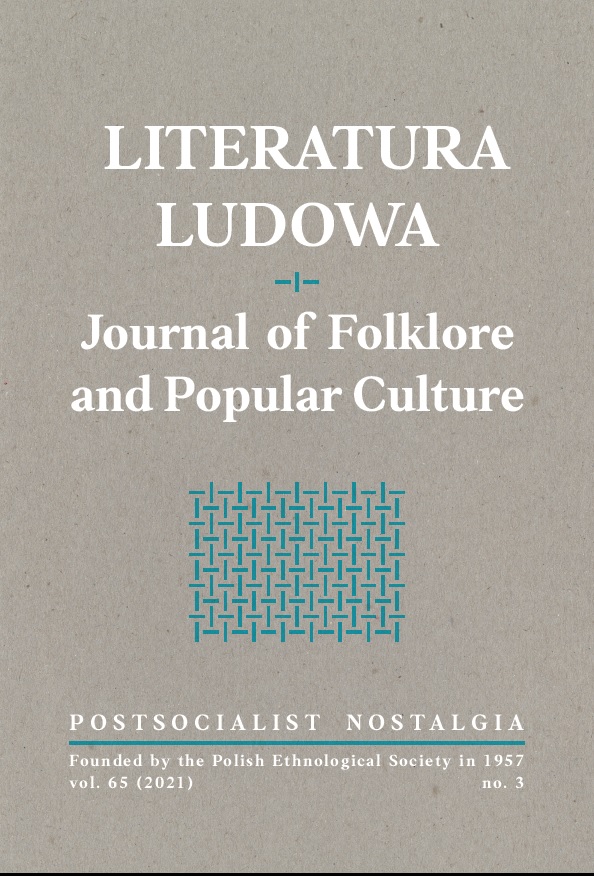Imperative nostalgia: Russian science fiction novels about moving to the 1970s USSR
DOI:
https://doi.org/10.12775/LL.3.2021.003Keywords
nostalgia, late socialism, time-travel, science fiction, fantastic historical novel, myths about the USSRAbstract
The article examines selected novels by Russian science fiction writers concerning the transition of heroes in the 1970s of the Soviet Union. These novels began being published quite recently, mostly by the authors themselves. The article formulates the differences between such works and similar fantastic historical novels: the hero’s arrival into his own era, the absence of the motive of “reviving history”, etc. The analysis of the novels allows us to conclude that this particular image of the bygone Soviet era is built by not only describing real historical events, but also using myths and stereotypes concerning the USSR. Nostalgia for late socialism permeates the novels, while calls for the restoration of the Soviet Union are already formulated in the very titles. Accordingly, another kind of nostalgia stands out – an imperative one with the following features: the absence of a utopian image of a bygone time; an active character, which makes the nostalgic feeling the opposite of the elegiac one. This imperative nostalgia based on myths and stereotypes is shared by readers who see Perestroika as a human catastrophe that destroyed the “wonderful world”. In addition, they are close to the conversational aggressive style with which the novels are written, as well as the image of a self-righteous hero. Imperative nostalgia reflects the needs for the restoration of the Soviet Union that have formed in modern society.
References
Abasheva, M. P., Litovskaya, M. A., Savkina I. L., Chernyak M. A. (eds.) (2020). Kul't-tovary. Kommertsializatsiya istorii v massovoy kul'ture. Moskva–Yekaterinburg: Kabinetnyy uchenyy.
Aldanov, M. (1993). Sobraniye sochineniy (vol. 6, part 3). Moskva: Pressa.
Boym, S. (2013). Budushcheye nostal'gii. Neprikosnovennyy zapas, 3, 118–139.
Vasilevskiy, L. M. (1924). K zdorovomu polovomu bytu. Moskva: Novaya Moskva.
Viktorov, E. (2009). Poslednyaya seksual'naya revolyutsiya v sovetskom obshchestve. Voprosy kul'turologii, 12, 54–58.
Vorob'yeva, M. V. (2008). Anekdot kak fenomen povsednevnoy kul'tury sovetskogo obshchestva (na materiale anekdotov 1960–1980-kh godov). [Unpublished doctoral lecture]. Yekaterinburg: Ural'skiy universitet.
Gorin, D. (2007). Konets perspektivy. Perezhivaniye vremeni v kul'ture 1970-kh. Neprikosnovennyy zapas, 2, 111–122.
Drozdov, A. (2020). Revanshist. 1S-Pablishing.
Yemelin, S. M. (2019). Sotsial'naya politika v otnoshenii invalidov v SSSR posle Velikoy Otechestvennoy voyny. Problema soblyudeniya prav cheloveka i ideologicheskoy tselesoobraznosti. Vestnik VEGU, 2(100), 59–70.
Karasev, L. (2007). 1970-ye kak perezhivaniye. Neprikosnovennyy zapas, 2, 243–251.
Koz'mina, Ye. Yu. (2017). Fantasticheskiy avantyurno-istoricheskiy roman. Poetika zhanra. Moskva–Yekaterinburg: Kabinetnyy uchenyy.
Kol'tsov, M. I. (2013). Seriynyye ubiystva v istorii sovetskogo i rossiyskogo ugolovnogo pravoprimeneniya. Vestnik TGU, 1(117), 325–330.
Korolyuk, M. (2014). Spasti SSSR. Infil'tratsiya. Al'fa-Kniga.
Lipovetskiy, M., Mikhaylova, T. (2021). Bol'she, chem nostal'giya (Pozdniy sotsializm v teleserialakh 2010-kh godov). Novoye literaturnoye obozreniye, 169, 127–147.
Sinyavskiy, A. (2003). Literaturnyy protsess v Rossii. Literaturno-kriticheskiye raboty raznykh let (ed. M. V. Rozanova). Moskva: RGGU.
Tamarchenko, N. D. (2008). Istoricheskoye vremya. In N. D. Tamarchenko, Poetika. Slovar' aktual'nykh terminov i ponyatiy (pp. 88-89). Moskva: Izdatel'stvo Kulaginoy, Intrada.
Tamarchenko, N. D., Tyupa, V. I., Broytman, S. N. (2004). Teoriya literatury (vol. 2, part 1). Moskva: Akademiya.
Fefelov, V. (1986). V SSSR invalidov net! London: Overseas Publications Interchangе.
Shchepetnov, Ye. (2020). 1972. SOYUZ nerushimyy. Moskva: Eksmo.
Edel'man, O. (1999). Legendy I mify Sovetskogo Soyuza. Logos, 5, 5–15.
Yurchak, A. (2014). Eto bylo navsegda, poka ne konchilos'. Posledneye sovetskoye pokoleniye. Moskva: Novoye literaturnoye obozreniye.
Downloads
The publisher's shop:
Published
Versions
- 2023-04-07 (2)
- 2021-12-23 (1)
How to Cite
Issue
Section
License

This work is licensed under a Creative Commons Attribution-NoDerivatives 4.0 International License.
1. The authors give the publisher (Polish Ethnological Society) non-exclusive license to use the work in the following fields:a) recording of a Work / subject of a related copyright;
b) reproduction (multiplication) Work / subject of a related copyright in print and digital technique (ebook, audiobook);
c) marketing of units of reproduced Work / subject of a related copyright;
d) introduction of Work / object of related copyright to computer memory;
e) dissemination of the work in an electronic version in the formula of open access under the Creative Commons license (CC BY - ND 3.0).
2. The authors give the publisher the license free of charge.
3. The use of the work by publisher in the above mentioned aspects is not limited in time, quantitatively nor territorially.
Stats
Number of views and downloads: 405
Number of citations: 0



